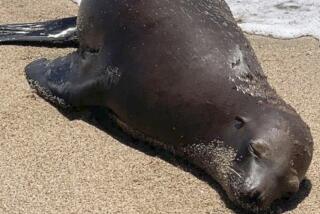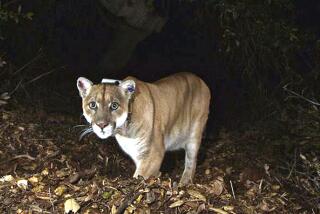Lion Attacks Prompt Park Ban on Children
- Share via
SAN JUAN CAPISTRANO — Fearful of more costly court awards arising from mountain lion attacks, the Orange County Board of Supervisors will ban children from the county’s largest park, the site of two maulings in 1986, officials said Wednesday.
The board’s decision to keep those under 18 out of 9,000-acre Ronald W. Caspers Wilderness Park will take effect Monday. It was blamed on a $2-million court award in August, 1991, to the family of an El Toro girl mauled by a mountain lion in March, 1986, said Robert Fisher, the county’s director of harbors, beaches and parks.
“It is a real shame,” Fisher said. “I feel very bad, being the parks director, that we have to keep people from that parkland. This is a very cautious and conservative approach as to what to do.”
The decision extends a limited ban imposed shortly after the August court award, when the board closed most of the park to children. It admitted them only to the interpretive center, playground and picnic areas, and only when parents accompanied them and signed a release.
With a second court case on another 1986 mauling pending, the board decided that the risk of more incidents and liability was too great, Fisher said. The supervisors’ decision, made in closed session Tuesday, was reached reluctantly, he added.
Carl Maier, chief of field services for the state Department of Parks and Recreation, which oversees 1.3 million acres of parks statewide, said he had never heard of such a ban.
“It hasn’t happened in the state system,” Maier said. “We have had some animal problems, particularly with bears and campers, but nothing severe. Our experience is that mountain lions steer clear of humans.”
Sierra Club spokesman Ken Croker said the decision was an overreaction.
“It’s a sad commentary on how litigation in our society allows natural acts to control our policies,” he said. “We have to come to terms with living in our natural environment. That’s a risk inherent with going camping in the mountains, just like swimming in the ocean.”
Fisher said the closure may be temporary, pending an appeal of the $2-million award and the possibility of state legislation that would free the county from liability in such incidents.
Terry Mansfield, a senior biologist with the state Department of Fish and Game who testified at the Small trial, agreed that the ban was unusual.
More to Read
Sign up for Essential California
The most important California stories and recommendations in your inbox every morning.
You may occasionally receive promotional content from the Los Angeles Times.













